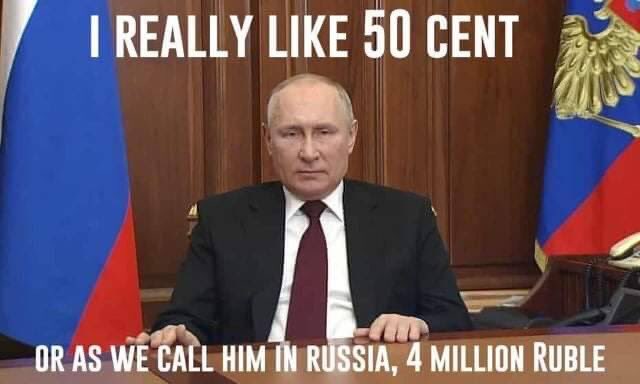O problema com NARRATIVAS é que precisam sempre contornar essa irrelevância chamada REALIDADE; é o caso do texto postado pelo nosso cupincha @knigh7. Claro, sem o estar inculpando de nada, cada um sabe de si e, se prefere se (e nos) "informar" pela Lame$tream, está no seu direito.
Só que há fontes reais também: não os "
influencers" pequenos, médios e grandes (mas todos pagos ou em busca de pagamento) que pululam nas redes sociais (FAKEBOOK, Twitter, YT, etc) e sim o cara comum, que já mencionei e para variar, ninguém deu bola. Há ainda indicadores de atividade econômica que falam por si:

O Ouro começou disparado noite passada, estando agora, no entanto, no mesmo nível em que terminou a semana passada;

O Petróleo idem, ontem ensaiou uma corrida rumo aos USD 100 e neste momento está outra vez perto dos USD 91 com que terminou a semana;

O Gás então,
A GRANDE BOMBA, nem se mexeu.
Como assim, POWS???
![[085]](./images/smilies/085.gif)
![[085]](./images/smilies/085.gif)
![[085]](./images/smilies/085.gif)
![[085]](./images/smilies/085.gif)
A queda momentânea do RUB era esperada, dada a pressão exercida sobre ele e a consequência natural, a corrida aos bancos e corretoras; mas já começa a se recuperar (via aumento brutal da taxa de juros). As empresas Russas também, além da simples
Panic Sale, ainda não faltou cara e$perto para fazer SHORT o que, outra vez, é normal. Mas o importante é que isso tudo é fogo de palha, logo se acaba e as coisas voltam ao normal.
Agora, algumas perguntas que a Lame$tream nem tenta responder:

Como é que a Ucrânia, que não conseguia nem lidar com uns meros guerrilheiros separatistas apoiados por Moscou agora consegue causar baixas praticamente incapacitantes à própria Rússia? Sério que alguém aí acredita que uns RPGs, ATGMs e MANPADS fazem essa diferença toda?

Como a Rússia, o principal fornecedor de energia à Europa, pode ser cortada da Economia Mundial e os insumos que fornece/fornecia ficam na mesma? Estará dando Petróleo o Gás de graça aos seus inimigos?

Ou, se eles continuam a pagar (e em moeda "forte"), que diabos de sanção ao Banco Central dos caras está em vigor? RUB é
shitcoin, cada um vale uns cinco centavos de BRL (que é outra
shitcoin, aliás) mas EUR ainda vale bastante (BRL 5,79): adianta atacar uma moeda fraca enquanto mantém o suprimento de moeda forte? Olhem a Argentina aqui do lado, se fosse só o ARS caindo estavam de boas, a josta é que está cada vez mais complicado o acesso a USD e EUR, e isso sim, DÓI.

Só cai na narrativa quem quer, ainda mais quando estão acusando os caras do que ianques e Europeus fazem desde sempre, como se fosse um divisor de águas: então entrar no Afeganistão, botar um governo-fantoche e ocupar o País por duas décadas é diferente? Iraque? E ainda por cima só não fizeram na Síria porque os mesmos Russos malvados e fascistas se meteram?
Aí fica sodas...



 IMPORTANTE -
IMPORTANTE - Este post é dirigido apenas a Brasileiros, os nossos amigos Europeus têm suas razões para pensarem como pensam (eu talvez pensasse igual se o fosse); a única coisa que lhes dedico aqui, além de minha Amizade, é que sua Economia, queiram aceitar ou não, está em queda livre, isso não tem mais volta, à exceção dos paliativos que seus governantes lhes estão aplicando, criar guerras para mantê-los olhando para o outro lado até chegar o inevitável: a quebra.
PARA OS BRAZUCAS, APENAS LEMBREM: APÓS MESES DE PROVOCAÇÕES, FINALMENTE CONSEGUIRAM LEVAR A RÚSSIA À GUERRA (E TORÇAMOS PARA QUE NÃO CHEGUE ÀS NUKES); TAMBÉM CHEGARÁ A NOSSA VEZ!












